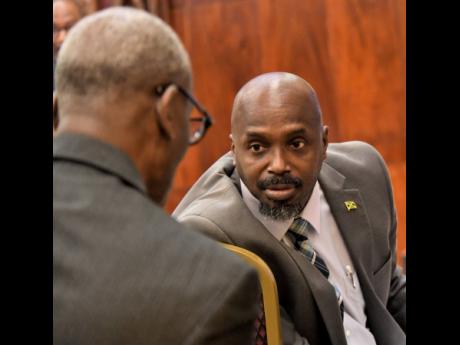DELAY DEFENCE
ODPEM says hourslong silence after quake resulted from adherence to protocols
The State’s leading emergency management agency says it was following protocols when it took more than six hours to address the nation in the aftermath of arguably the most significant earthquakes the country has experienced in three decades. “You...
The State’s leading emergency management agency says it was following protocols when it took more than six hours to address the nation in the aftermath of arguably the most significant earthquakes the country has experienced in three decades.
“You have to follow a protocol. You are in the middle of a response so you are generating information, you are pulling down information and you have to brief and update your respective portfolio ministers, and that goes up to the prime minister,” Richard Thompson, acting director general of the Office of Disaster Preparedness and Emergency Management (ODPEM), told The Gleaner.
“It should not be a situation where you speak to media and then your portfolio minister or the head of the country is hearing that information in the news without you having spoken to them on the matter,” he added.
Thompson’s defence comes amid criticism that the agency failed to provide adequate regular updates to the frightened public.
Shortly after the earthquake, Prime Minister Andrew Holness, who chairs the National Disaster Risk Management Council, briefed the country in a video message, surrounded by Cabinet members. There were no technocrats from the agency present, with Thompson’s first address to the public coming during a press conference held at the Office of the Prime Minister in the late afternoon.
While noting the Government’s efforts to homogenise communication by sharing information from Cabinet members and experts, communications consultant Tony Morrison believes ODPEM should have been more present earlier in the communication about the crisis.
“Updates in terms of what they knew at the time would have helped, leading up to the press conference,” he said.
“I don’t know what the situation is with ODPEM, I am getting the impression that, at least where communication is concerned, they both need some advice and some staff, apparently.”
NO SOCIAL MEDIA PRESENCE
Of concern, he shared, there is the fact that the agency does not have an active social media presence, which he said is integral to disseminating information.
“There was a time when something happened and if you wanted information you turn on your radio. Now people go to their phones and they check social media. That’s where most people today look for information, and that’s where you want to put information if you have important information to put out and if you know that the public is looking for it,” he said.
Barbara Carby, former director of the ODPEM, who had previously voiced concerns that the agency’s visibility is being dwarfed by the input of politicians, told The Gleaner that while it is important for the agency to brief its executive body, it also has an equally significant responsibility to the public.
“But I think what might be forgotten is that ODPEM has responsibility for public safety and ensuring the public is safe through the information that it gives out. So apart from its coordination of the response, where they would try to coordinate with all the agencies, one of their responsibilities is to ensure that the public has information which can keep it safe,” Carby said, adding that amalgamation of communication strategy into the Government is concerning “if it prevents them from doing what is expected of them”.
She added: “So, in other words, the Government would decide how it is going to manage the information flow. But in the management of that information flow, public safety must not be compromised.
“Apart from just putting out information, an ODPEM provides a trusted voice – a voice which is neutral, it is authoritative, it is technically competent, and this helps to reassure the public in a time of stress. And that should not be overlooked as a part of ODPEM’s role,” said Carby.
In the meantime, Dr Parris Lyew-Ayee, chairman of the Scientific Research Council, told The Gleaner that Jamaicans ought not be alarmed by the earthquakes that have occurred recently, pointing out that the island is near a plate boundary between the North American plate and the Caribbean plate and there are active plates all over the island. Monday’s 5.6-magnitude earthquake was preceded by a 5.2 earthquake in September.
He, however, stressed that what is important is for the country’s disaster preparedness mechanism is training, include teaching people how to stay calm during the event.
“If we don’t know how to stay calm and do the right thing when the moment arrives, that’s when people die; not because buildings are collapsing on their face, but it’s because of their own reaction,” he said.
“[Preparedness is] not a jiggle, not a church service, but part of the built-in response within our society to prevent real tragedy from happening.”

